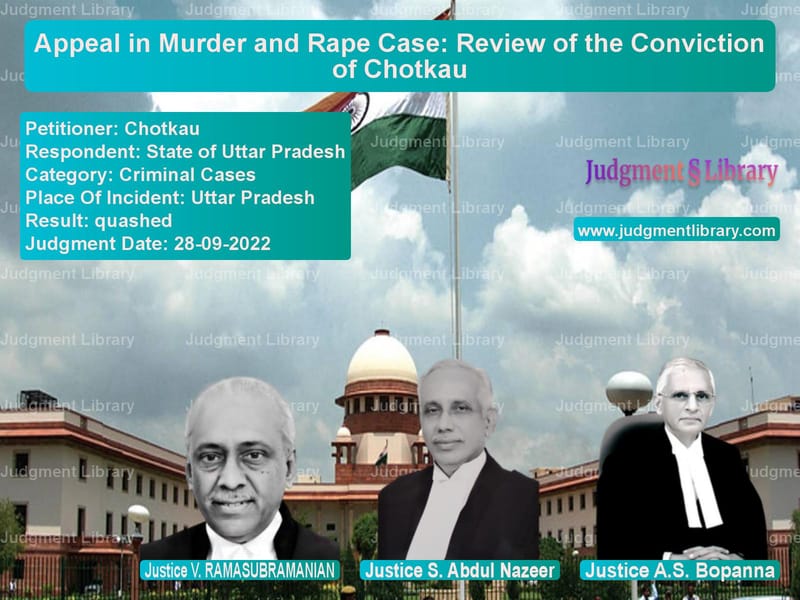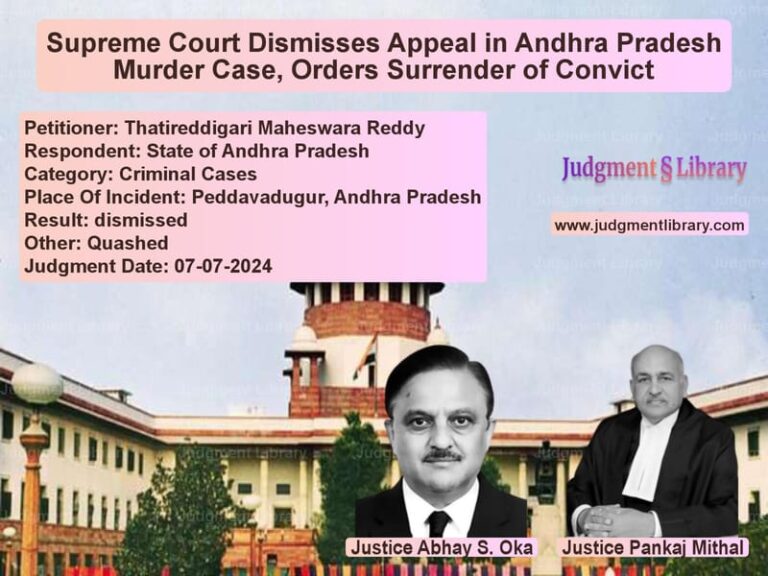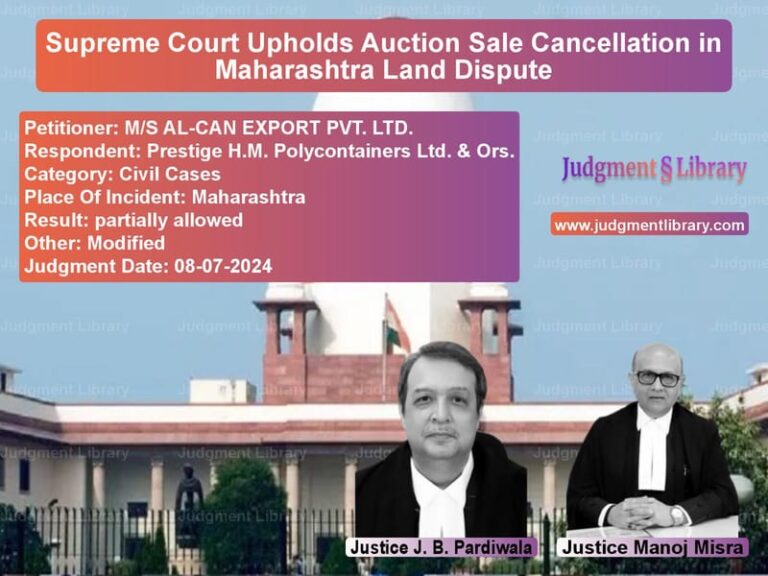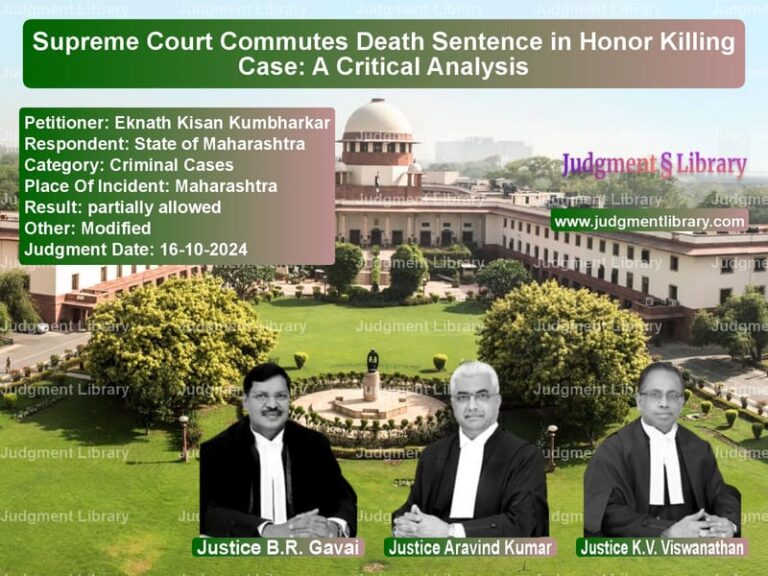Appeal in Murder and Rape Case: Review of the Conviction of Chotkau
This appeal arises from the conviction of Chotkau, who was sentenced to death by the Sessions Court for the offences punishable under Sections 302 and 376 of the Indian Penal Code (IPC). The charge against the appellant was that he raped and murdered a six-year-old girl, Uma Devi, in Shravasti, Uttar Pradesh. The conviction was confirmed by the High Court of Uttar Pradesh, which led to this appeal before the Supreme Court. The appellant, through his legal counsel, has challenged the judgment, and the Supreme Court is tasked with reviewing the findings of both the Sessions Court and the High Court.
Petitioner’s Argument
The appellant’s counsel, Shri S. Nagamuthu, raised several contentions to challenge the conviction. The primary argument revolved around the trustworthiness of the testimonies of the witnesses (PWs 1 to 3), who were crucial to establishing the circumstantial evidence linking the appellant to the crime. The appellant’s defense was that the testimonies of these witnesses were unreliable, especially given the contradictions regarding the details of the crime scene and the delay in lodging the First Information Report (FIR).
Shri Nagamuthu also pointed out the discrepancies in the investigation, including the failure of the police to conduct a proper forensic examination and medical examination of the appellant. The lack of such critical evidence was highlighted as a significant flaw in the prosecution’s case, which, according to the appellant’s counsel, should have led to the rejection of the charges.
The appellant further argued that the FIR was not registered promptly, and there were serious contradictions about the location where the body was found and the manner in which it was handled. Additionally, the defense contended that the questioning under Section 313 of the Cr.P.C. was not conducted properly, which further undermined the fairness of the trial.
Respondent’s Argument
On behalf of the State of Uttar Pradesh, Shri Ardhendumauli Kumar Prasad, the learned Additional Advocate General, defended the conviction. He argued that the testimonies of PWs 1 to 3 were consistent and trustworthy. These witnesses were critical in establishing the chain of events that led to the discovery of the victim’s body in the sugarcane field, and their statements were corroborated by other evidence. The respondents also emphasized that the delay in sending the FIR to the court did not vitiate the trial, as the prosecution provided a satisfactory explanation for the delay.
Read also: https://judgmentlibrary.com/bail-in-murder-case-a-legal-analysis-of-the-aminuddin-case/
Shri Prasad further argued that the appellant’s defense, which suggested a conspiracy involving a land dispute and false implication by a local powerful person, was not substantiated by any credible evidence. The theory of false implication was dismissed by the High Court, which found the circumstantial evidence to be overwhelming.
Court’s Analysis and Ruling
The Supreme Court reviewed the entire case, focusing on several key issues, including the trustworthiness of the testimonies of PWs 1 to 3, the delay in registering the FIR, and the failure of the prosecution to conduct a thorough investigation, including a medical examination of the accused.
The Court first addressed the trustworthiness of the witness testimonies. It noted that while the Sessions Court and High Court had found the testimonies of PWs 1 to 3 to be credible, there were significant contradictions in their statements that warranted further scrutiny. Specifically, the Court found discrepancies regarding the place where the victim’s body was found, the handling of the body, and the involvement of certain key witnesses. These contradictions raised doubts about the reliability of the prosecution’s case.
The Court also highlighted the delay in forwarding the FIR to the court, which, in this case, was a delay of five days. The appellant’s counsel argued that this delay indicated a possible manipulation of the FIR, and the Court considered this as an important factor in determining the credibility of the prosecution’s case. The Supreme Court referred to previous rulings, noting that while a delay in sending the FIR to the Magistrate is not automatically fatal to the prosecution’s case, in this case, the delay coupled with the contradictions in the evidence raised doubts about the integrity of the investigation.
Another significant issue was the failure to conduct a proper forensic examination of the accused. The Court noted that while forensic evidence, such as DNA profiling, could have been crucial in proving the appellant’s guilt, the prosecution did not produce such evidence. The Court also referred to the provisions of Section 53A of the Cr.P.C., which mandates the examination of the accused in certain cases, including rape. The failure to obtain such evidence was deemed a critical omission that weakened the prosecution’s case.
The Court also reviewed the appellant’s defense, which was based on the claim of false implication due to a family dispute over property. The appellant’s mother testified that the appellant was falsely implicated by a powerful local figure, Zalim Khan, due to a land dispute. However, the Court found that the evidence supporting this theory was insufficient and that the defense did not present a convincing argument to undermine the prosecution’s case.
In light of the discrepancies in the prosecution’s evidence, the Court expressed serious reservations about the guilt of the appellant. It was noted that the circumstantial evidence was not strong enough to conclusively prove that the appellant committed the crime. The Court emphasized the importance of a thorough and fair investigation, particularly in cases as serious as rape and murder, where the consequences are severe.
The Court, therefore, concluded that the evidence against the appellant was not strong enough to sustain the conviction. The judgment of the Sessions Court and the High Court was set aside, and the appellant was acquitted of all charges. The Court’s decision highlighted the need for careful scrutiny of evidence and the importance of ensuring that justice is served through a fair and unbiased process.
Conclusion
This case underscores the significance of conducting a fair and thorough investigation, particularly in cases involving serious charges such as rape and murder. The failure to conduct proper forensic examinations, coupled with the contradictions in the witness testimonies and the delay in sending the FIR to the court, led the Supreme Court to conclude that the prosecution’s case was not strong enough to sustain a conviction. The acquittal of the appellant serves as a reminder that justice must be based on solid evidence and fair procedures, rather than speculation or incomplete investigations.
Petitioner Name: Chotkau.Respondent Name: State of Uttar Pradesh.Judgment By: Justice V. RAMASUBRAMANIAN, Justice S. Abdul Nazeer, Justice A.S. Bopanna.Place Of Incident: Uttar Pradesh.Judgment Date: 28-09-2022.
Don’t miss out on the full details! Download the complete judgment in PDF format below and gain valuable insights instantly!
Download Judgment: chotkau-vs-state-of-uttar-prade-supreme-court-of-india-judgment-dated-28-09-2022.pdf
Directly Download Judgment: Directly download this Judgment
See all petitions in Fraud and Forgery
See all petitions in Custodial Deaths and Police Misconduct
See all petitions in Terrorist Activities
See all petitions in Judgment by V. Ramasubramanian
See all petitions in Judgment by S. Abdul Nazeer
See all petitions in Judgment by A. S. Bopanna
See all petitions in Quashed
See all petitions in supreme court of India judgments September 2022
See all petitions in 2022 judgments
See all posts in Criminal Cases Category
See all allowed petitions in Criminal Cases Category
See all Dismissed petitions in Criminal Cases Category
See all partially allowed petitions in Criminal Cases Category







